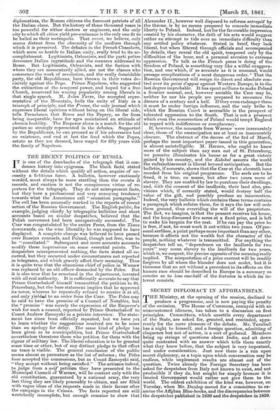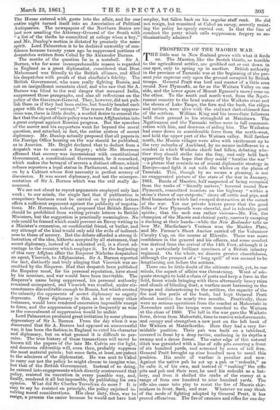SECRET DIPLOMACY IN AFFGHANISTAN.
THE Ministry, at the opening of the session, declined to produce a programme, and is now paying the penalty of the omission. The House of Commons, ennuyed with an unaccustomed idleness, has taken to a discussion on first principles. Committees, which unsettle every department of the State, are asked for, granted, and rescinded, appa- rently for the mere pleasure of the debate. Mr. Turnbull has a night to himself, and a foreign question, admitting of eloquence but not of action, is a sort of godsend. Members bring up strings of questions about India, and sit down quite contented with an answer which tells them exactly what they knew before, that the subject is very important, and under consideration. Just now there is a run upon secret diplomacy, as a topic upon which conversation may be endless, while unpleasant results are almost out of the question. Twice already the Foreign Secretary has been asked for despatches from Italy not known to exist, and not producible if they do, but sought for simply because it is fancied Government would rather not give them to the world. The oddest exhibition of the kind was, however, on Tuesday, when Mr. Dunlop moved for a committee to ex- amine the Affghan Blue-books, and the discrepancies between the despatches published in 1839 and the despatches in 1859. The House entered with gusto into the affair, and for one entire night turned itself into an Association of Political Antiquaries. The newspapers of the Northern States are just now assailing the Attorney-General of the South with a list of the thefts he committed at college when a boy," and Mr. Dunlop's motion is dictated by precisely the same spirit. Lord Palmerston is to be declared unworthy of con- fidence because twenty years ago he suppressed portions of despatches written from Cabal by Sir Alexander Burnes. The merits of the question lie in a nutshell. Sir A. Burnes who for some incomprehensible reason is regarded in England as a great diplomatist, considered that Dost Mahommed was friendly to the British alliance, and filled his despatches with proofs of that chieftain's fidelity. The British Government, who were really fighting Russia and not an insignificant mountain chief, and who saw that Sir A. Burnes was blind to the real danger that menaced India, suppressed those paragraphs, and also all reflections on the policy of the Governor-General. They, however, did not pub- lish them as if they had been entire, but frankly headed each paper with the word "extract." The reason for the suppres- sions was, there is little doubt, a morbid desire to conceal the fact that the object oftheir policy was to turn Affghanistan into a great outpost against Russian progress. But the speeches of the mover and his supporters went far beyond the moral question, and attacked, in fact, the entire system of secret diplomacy. Mr. Dunlop actually proposed that all papers in the Foreign Office bearing on the war should be published, as in America. Mr. Bright declared that to deduct from a despatch was to commit a forgery ; while Mr. Horsman affirmed that secrecy was inconsistent with constitutional Government, a constitutional Government, be it remarked, which makes the betrayal of secrets a distinct offence, which refuses reporters a legal status in Parliament, and is carried on by a Cabinet whose first necessity is perfect secrecy of discussion. It was secret diplomacy, and not the misrepre- sentation of Sir A. Burnes which was the evil really de- nounced.
We are not about to repeat arguments employed only last week ; to our minds, the single fact that if publication is compulsory business must be carried on by private letters offers a sufficient argument against the publicity of negotia- tions. Mr. Horsman, indeed, proposed that British Envoys should be prohibited from writing private letters to British Ministers but the suggestion is practically meaningless. No rule could be framed which could prevent an Envoy writing to a Minister's connexion, or confidential friend, or butler, and any attempt of the kind would only add the evils of indirect- ness to those of secrecy. But the debate afforded a strong il- lustration of the idea, hitherto accepted by all statesmen, that secret diplomacy, instead of a tolerated evil, is a direct ad- vantage to the country which employs it. In the beginning of this very Affghan affair the Emperor Nicholas despatched an agent, Vicovich, to Affghanistan. Sir A. Burnes reported the fact, distinctly and truly alleging that Vicovich was ac- credited by the Emperor. Had that despatch been published the Emperor must, for his personal reputation, have stood by his nominee, and war would have been inevitable. The Emperor's name being suppressed, his personal authority remained unimpaired, and Vicovich was recalled, under cir- cumstances discreditable enough to Russia, but which averted the calamity the opponents of secret diplomacy so eagerly deprecate. Open diplomacy in this, as in so many other instances, would have rendered concession impossible except to force, and the suppression of papers is frequently as wise as the concealment of suppression would be unfair. Lord Palmerston produced great irritation by some phrases deprecatory of Sir A. Burnes. From the day when it was discovered that Sir A. Burnes had opposed an unsuccessful war, it has been the fashion in England to extol his character and diplomacy, but on what ground it is difficult to per- ceive. The true history of these transactions will never be known till the papers of the late Mr. Colvin see the light, and decorous editorship will, even then, probably suppress the most material points ; but some facts, at least, are patent to the admirers of the diplomatist. He was sent to Cabul to carry out not the policy he might choose to imagine wise, but that of the British Government. Instead of so doing, he entered into engagements which directly contravened that policy, resisted its execution in every possible way, and, finally, rendered it all but impossible, by publishing his own opinion. What did Sir Charles Trevelyan do more ? It is easy to say he resisted on principle, the policy enjoined in- volving moral considerations. His clear duty, then, was to resign, a process the easier because he would not bare lost employ, but fallen back on his regular staff rank. He did not resign, but remained at Cabul an envoy, secretly resist- ing the policy he openly carried out. Is that the line of conduct the party which calls suppression forgery so en- thusiastically admires ?































 Previous page
Previous page